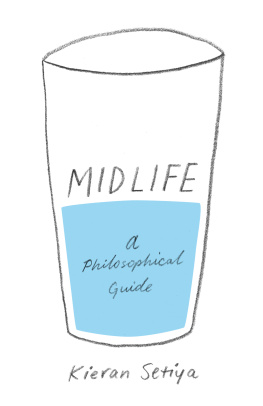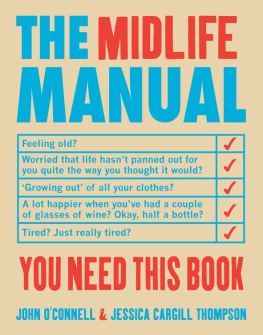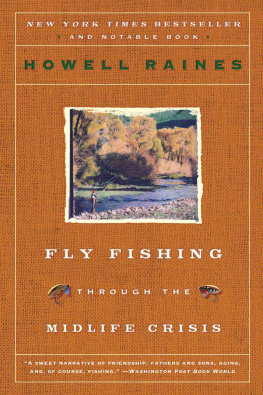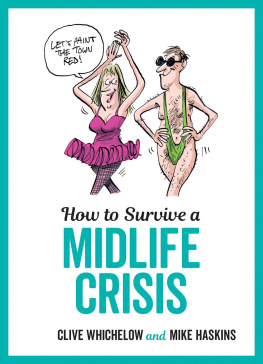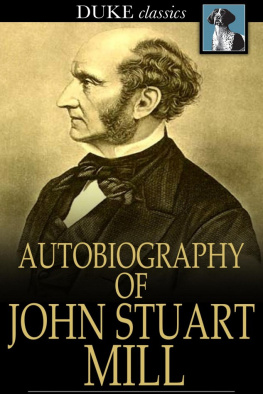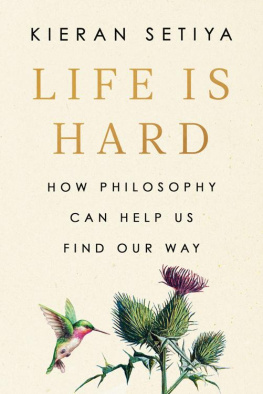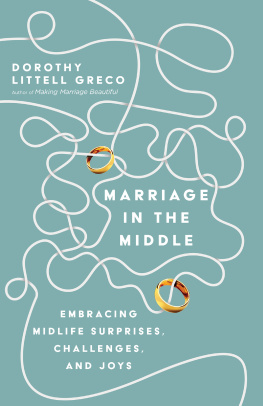
MIDLIFE

Kieran Setiya
PRINCETON UNIVERSITY PRESS
PRINCETON AND OXFORD
Copyright 2017 by Princeton University Press
Published by Princeton University Press,
41 William Street, Princeton, New Jersey 08540
In the United Kingdom: Princeton University Press,
6 Oxford Street, Woodstock, Oxfordshire OX20 1TR
press.princeton.edu
Jacket illustration and design by Amanda Weiss
All Rights Reserved
ISBN 978-0-691-17393-1
British Library Cataloging-in-Publication Data is available
This book has been composed in Baskerville 10 Pro
Printed on acid-free paper.
Printed in the United States of America
1 3 5 7 9 10 8 6 4 2
If I am not for myself, who will be for me?
And if I am for myself only, what am I?
And if not now, when?
RABBI HILLEL
CONTENTS
MIDLIFE
INTRODUCTION
There is a tale of two great rabbis in the first century BCE. Shammai is strict, doctrinal, exclusive. His rival, Hillel, is just the opposite: humane, flexible, open. The story tells of a gentile who agrees to convert to Judaism on condition of being taught the Torah while standing on one foot. Dismissed with contempt by Shammai, the gentile comes to Hillel, who accepts him, saying, That which is hateful unto you, do not do unto your neighbor. That is the whole Torah; all the rest is commentary. Now, go study.
This book is written in the spirit of Hillel, whose words form its epigraph. Like the Talmud, philosophy can be forbidding and esoteric. This is nothing new: try reading Kant or Aristotle. Nor is it all bad. Hillel does not dismiss the more exacting forms of scholarship: he ends with the injunction to study. But he believes that the message of Judaism can be communicated simply and that it matters enough to be worth trying even at the risk of seeming nave.
That is what I believe about philosophy. It could not survive without philosophers whose commitment to answering the most recalcitrant questions leads them into difficulty. But for all its disputes, uncertainties, and complications, academic philosophy has much to offer almost anyone in the midst of living, and wondering how to live, a human life.
My investment in this idea is personal, and not just because I teach philosophy for a living. I started thinking about midlife about six years ago, at the tender age of thirty-five. On the surface, life was going well. I had a stable family and career. I was a tenured professor in a good department housed in a congenial Midwestern city. I knew I was lucky to be doing what I loved. And yet there was something hollow in the prospect of doing more of it, in the projected sequence of accomplishments stretching through the future to retirement, decline, and death. When I paused to contemplate the life I had worked so hard to build, I felt a disconcerting mixture of nostalgia, regret, claustrophobia, emptiness, and fear. Was I having a midlife crisis?
You may protest that I was (and am?) too young for a midlife crisis. I appreciate the thought, though you should brace yourself for chapter 2. And in the end, I dont agree. What floored me were the existential questions of midlife, questions you are not too young to ask at thirty-five. You could ask them at twenty or at seventy, though I think they are especially salient when you reach my age. They are questions of loss and regret, success and failure, the lives you wanted and the life you have. They are questions of mortality and finitude, of emptiness in the pursuit of projects, whatever they are. Ultimately, they are questions about the temporal structure of human life and the activities that occupy it. This is a book not just for the middle-aged but for anyone coping with the irreversibility of time.
It is a work of applied philosophy: philosophical reflection trained on the challenges of midlife. And it takes the form of a self-help guide. The trials of middle age have been neglected by philosophers, but they are philosophically interesting, and they are amenable to therapy by the tools philosophers use. Until around the eighteenth century, there was no sharp line between moral philosophy and self-help. Philosophers agreed that contemplation of the good life should make our own lives better. The divorce between these aims is a more recent innovation. Nowadays, few philosophers write self-help books. When they do, they mostly invoke the classics, often the Roman Stoics, Cicero, Seneca, and Epictetus, as though philosophy lost its relevance to life two thousand years ago. My approach is not historical. Though I mention past philosophers, ancient and modern, I do not treat them as sage-like repositories of wisdom but as interlocutors in working through the issues for myselfand, I hope, for you.
This book differs from standard self-help in part because it is more concerned with basic questions of how to feel about your life, in part because it is less concerned with outward change. For most of us, midlife is not too late to start something new, though it often feels that way. Dont be fooled by the foreshortening of time that accompanies middle age. You have more time than you think. That said, there are other books to consult for practical advice about career change at fifty or being single at forty-five. That is not the sort of advice I will give. But I will attempt to give advice, to communicate strategies for adapting to midlife inspired by philosophical ideas. Where the advice is familiar, I will explore the philosophy behind it. Where it is unfamiliar, I will argue that it is right.
In doing so, I assume no prior knowledge. I have tried to write a book that can be read while standing on one foot: technicalities are suppressed and I opt for brevity over completeness. The chapters that follow address what are, in effect, just some of the many midlife crises. There is the sense that life is too demanding, too consumed with needs, which is the focus of chapter 2. In resolving it, we will explore conceptions of reason, value, and the good life that owe their origin to Aristotle, and we will learn the importance of doing what you need not do. There is the sense of confinement in ones present life, however happy it may be, the acknowledgment of lost alternatives, which is the subject of chapter 3. We will learn how options are overrated and why there is something good about missing out. There is the sense of an imperfect, unchangeable past with which you must come to terms, in chapter 4. We will learn when and why you should be glad you made a mistake. There is the sense of time passed by, or running out, awareness of mortality, in chapter 5. We will engage with philosophical treatments for fear of death. And there is the sense of repetition and exhaustion in the succession of projects, day by day, and year by year, which is the subject of chapter 6. We will learn what it would mean to live in the present, how it could solve your midlife crisis, and why meditation helps.
Before we look for answers, we begin, in chapter 1, with a history of the question. We will investigate the stereotype of midlife as a time of crisis, unearthing its recent past. We will map its shifting present, its evolution from dizzying trauma to manageable malaise. And we will find a place for philosophy in its future. Contemporary philosophers have paid too little mind to aging, to the physical and temporal situations of childhood, midlife, and old age. It is time for that to change.
A BRIEF HISTORY OF THE MIDLIFE CRISIS
According to poet and librarian Philip Larkin, Sexual intercourse began / In nineteen sixty-three / (which was rather late for me). In dissecting the crisis, Jaques quotes a patient in his mid-thirties:
Next page
